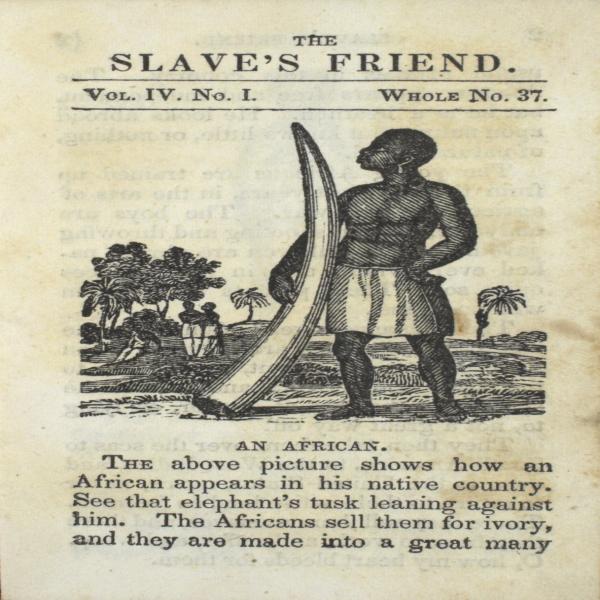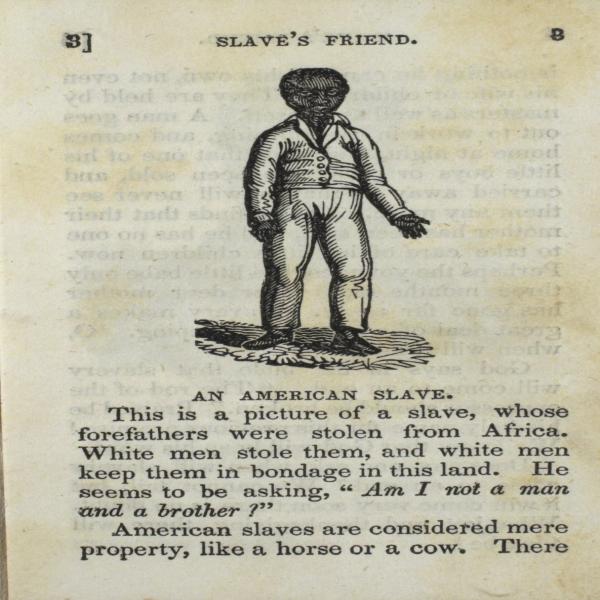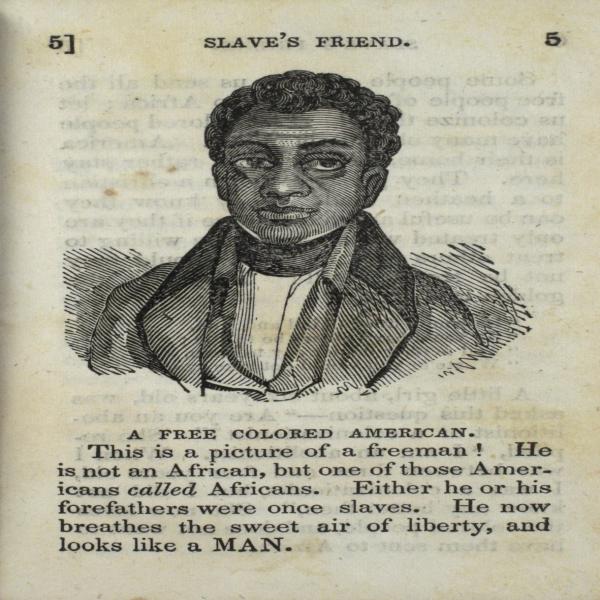The Slave's Friend
Original



Background Notes
This short children's book was written and published by R.G. Williams for the American Anti-Slavery Society in New York in 1839. By this time there was a large amount of literature created by the various benevolent societies aimed at young people. They all attempted to blend moral teachings with entertainment and education. This particular book is an abolitionist tract aimed at representing Africans, slaves, and freemen differently from the ape-like caricatures so often found in the popular press. The first illustration shows the native African as a noble savage in need of missionizing. It shows the enslaved man as "a man and a brother." The freed man in this book is the idealized, affluent "American" who is called African.
Also referenced in this work is the American Colonization Society (ACS), an unusual society among the benevolent societies of the time. Founded in 1816, this society sought to free slaves, and rather than incorporate them into American society, wanted to send them back to Africa. The organization helped to found the colony of Liberia, in West Africa; in 1847, Liberia declared itself an independent republic. The work of the ACS was strongly opposed by abolitionist groups and by some black Americans.
Transcription of Primary Source
GOOD RESOLUTION.
When my father comes home in the evening from work,
Then I will get up on his knee,
And tell him how many nice lessons I learn,
And show him how good I can be.
He shall hear what a number I know how to count,
And I'll tell him what works I can spell,
And if I can learn something every day,
I hope soon I shall read very well.
I'll say to him all the nice verses I know,
And tell him how kind we must be,
That we never must hurt poor dumb creatures at all,
And he'll kiss me and listen to me.
I'll tell him we always must try to please God,
And never be cruel or rude,
For God is the Father of all living things,
And he cares for and blesses the good.
AN AFRICAN.
The above picture shows how an African appears in his native country. See that elephant's tusk leaning against him. The Africans sell them for ivory, and they are made into a great many useful articles in this country. The African appears free and independent, but he is a heathen. He looks abroad upon nature, but knows little, or nothing, of nature's God.
The young Africans are trained up from their earliest years, in the arts of agriculture and war. The boys are daily exercised in shooting and throwing javelins. The children are almost naked every where, and in many places quite so. Their parents adorn them with emblems.
The kidnappers very often seize the children while they are at play, when their parents are absent, carry them to the boats in the rivers, and then to the slave-ships that are at anchor, or lying to, not a great way off.
They then take them over the seas to South America, to the West Indies, and even to the United States, never, never to return to their native land as freemen. There they sell them as slaves, and there they have to work, and suffer, and weep. O, how my heart bleeds for them.
AN AMERICAN SLAVE.
This is a picture of a slave, whose forefathers were stolen from Africa. White men stole them, and white men keep them in bondage in this land. He seems to be asking, "Am I not a man and a brother?"
American slaves are considered mere property, like a horse or a cow. There is nothing he can call his own, not even his wife or children. They are held by masters as well as himself. A man goes out to work in the morning, and comes home at night, and finds that one of his little boys or girls have been sold, and carried away so that he will never see them any more. Or, he finds that their mother has been sold, and he has no one to take care of his little children now. Perhaps the youngest is a little babe only three months old. Her dear mother has gone far away. Slavery makes a great deal of sorrow and weeping. O, when will it end?
God says in the bible that slavery will come to an end. "The rod of the oppressor should be broken." Praised be his holy name for this precious promise! We know that God will keep his word.
Does any one ask, when will slavery come to an end? We cannot tell, but it will come very soon there is no doubt. What joy and thanksgiving there will then be!
A FREE COLORED AMERICAN.
This is a picture of a freeman! He is not an African, but one of those Americans called Africans. Either he or his forefathers were once slaves. He now breathes the sweet air of liberty, and looks like a MAN.
Some people say, let us send all the free people of color home to Africa; let us colonize them! The colored people have many objections to this. America is their home, and they had rather stay here. They prefer living in a christian to a heathen land. They know they can be useful and happy here if they are only treated well. They are willing to treat others well, and why should they not be treated well? They like the golden rule.
"Be you to others kind and true,
"As you'd have others be to you;
"And neither do nor say to them,
"Whate'er you would not take again."
A little girl, about six years old, was asked this question-"Are you an abolitionist or a colonizationist?" She replied, "I am an abolitionist. When I was between three and four years old, I was a colonizationist, but I did not know any better then." She now loves the colored people, and does not want to have them sent to Africa.
SELLING HUMAN BEINGS.
In a newspaper printed in Kentucky Nov. 22, 1837, are two advertisements informing the public, that there will be exposed to sale, by public auction, 13 persons whose names are ELLEN, JANE, EVERARD, SAM, PRESTON, SCIPIO, SIDNEY, ANN, MARY, DICK, TOM, MARIA, SUSAN and her infant CHILD.
How dreadfully they must have felt! And their relations too, much afflicted they must be! Many parents and children, many brothers and sisters, many husbands and wives were parted, I dare say, by the auctioneer's hammer, when the sale took place. How many sighs, and groans, and tears, and heart-aches there must have been!
The bible tells us we must "remember them that are in bonds as bound with them." I have a little daughter ELLEN, and I must remember Ellen the slave as if she were my daughter! I have a niece named MARY, who is soon to be married, and she must remember Mary the slave who may have been parted from her lover. I have a niece named JANE, who is a young married woman, and she should remember the slave Jane, who may have been parted from her husband. And I know a woman named SUSAN, with an infant child, and several other children, and I hope they will remember the poor slave mother, and her little baby, "as bound with them."
Ah! What cruel things are done by slaveholders-What sufferings the poor slaves have to undergo. Dear readers! never forget them, but feel for them, pray for them, work for them. Surely God will deliver them.